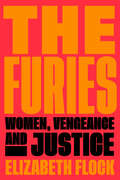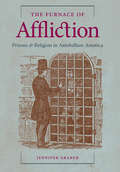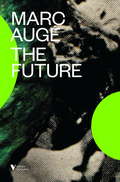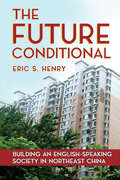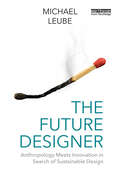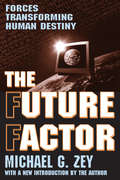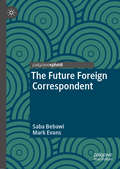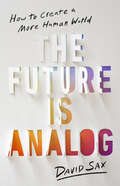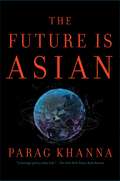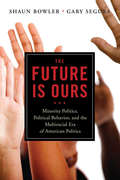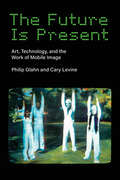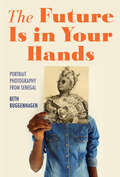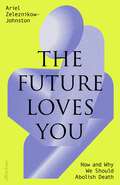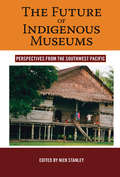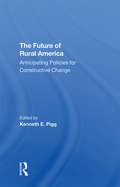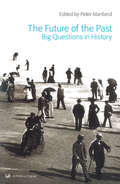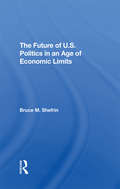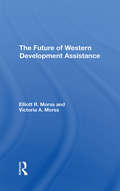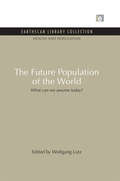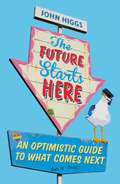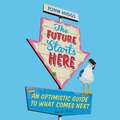- Table View
- List View
The Furies: Women, Vengeance, and Justice
by Elizabeth FlockRenowned journalist and author of The Heart is a Shifting Sea Elizabeth Flock investigates what few dare to confront, or even imagine: the role and necessity of female-led violence in response to systems built against women.In The Furies, Elizabeth Flock examines how three real-life women have used violence to fight back, and how views of women who defend their lives are often distorted by their depictions in media and pop culture. These three immersive narratives follow Brittany Smith, a young woman from Stevenson, Alabama, who killed a man she said raped her but was denied the protection of the Stand-Your-Ground law; Angoori Dahariya, leader of a gang in Uttar Pradesh, India, dedicated to avenging victims of domestic abuse; and Cicek Mustafa Zibo, a fighter in a thousands-strong all-female militia that battled ISIS in Syria. Each woman chose to use lethal force to gain power, safety, and freedom when the institutions meant to protect them—government, police, courts—utterly failed to do so. Each woman has been criticized for their actions by those who believe that violence is never the answer.Through Flock’s propulsive prose and remarkable research on the ground—embedded with families, communities, and organizations in America, India, and Syria—The Furies examines, with exquisite nuance, whether the fight for women’s safety is fully possible without force. Do these women’s acts of vengeance help or hurt them, and ultimately, all women? Did they create lasting change in entrenched misogynistic and paternalistic systems? And ultimately, what would societies in which women have real power look like?Across mythologies and throughout history, the stories of women’s lives frequently end with their bodies as sites of violence. But there are also celebrated tales of women, real and fictional, who have fought back. The novelistic accounts of these three women provoke questions about how to achieve true gender equality, and offer profound insights in the quest for answers.
The Furnace of Affiction: Prisons and Religion in Antebellum America
by Jennifer GraberFocusing on the intersection of Christianity and politics in the American penitentiary system, Jennifer Graber explores evangelical Protestants' efforts to make religion central to emerging practices and philosophies of prison discipline from the 1790s through the 1850s. Initially, state and prison officials welcomed Protestant reformers' and ministers' recommendations, particularly their ideas about inmate suffering and redemption. Over time, however, officials proved less receptive to the reformers' activities, and inmates also opposed them. Ensuing debates between reformers, officials, and inmates revealed deep disagreements over religion's place in prisons and in the wider public sphere as the separation of church and state took hold and the nation's religious environment became more diverse and competitive. Examining the innovative New York prison system, Graber shows how Protestant reformers failed to realize their dreams of large-scale inmate conversion or of prisons that reflected their values. To keep a foothold in prisons, reformers were forced to relinquish their Protestant terminology and practices and instead to adopt secular ideas about American morals, virtues, and citizenship. Graber argues that, by revising their original understanding of prisoner suffering and redemption, reformers learned to see inmates' afflictions not as a necessary prelude to a sinner's experience of grace but as the required punishment for breaking the new nation's laws.
The Furthest Goal: Engelbert Kaempfers Encounter with Tokugawa Japan
by Derek Massarella Beatrice Bodart-BaileyThis important study brings together some of the best current research on Kaempfer (author of the History of Japan, also published by Curzon) for the first time and includes a close analysis of 6 key topics from the writing of the History to an interpretation of the interpreter himself.
The Fury Archives: Female Citizenship, Human Rights, and the International Avant-Gardes (Modernist Latitudes)
by Jill RichardsIn the late nineteenth and early twentieth centuries, radical women’s movements and the avant-gardes were often in contact with one another, brought together through the socialist internationals. Jill Richards argues that these movements were not just socially linked but also deeply interconnected. Each offered the other an experimental language that could move beyond the nation-state’s rights of man and citizen, suggesting an alternative conceptual vocabulary for women’s rights.Rather than focus on the demand for the vote, The Fury Archives turns to the daily practices and social worlds of feminist action. It offers an alternative history of women’s rights, practiced by female arsonists, suffragette rioters, industrial saboteurs, self-named terrorists, lesbian criminals, and queer resistance cells. Richards also examines the criminal proceedings that emerged in the wake of women’s actions, tracing the way that citizen and human emerged as linked categories for women on the fringes of an international campaign for suffrage.Recovering a transatlantic print archive, Richards brings together a wide range of activists and artists, including Lumina Sophie, Ina Césaire, Rosa Luxemburg, Rebecca West, Angelina Weld Grimké, Elizabeth Gurley Flynn, Hannah Höch, Claude Cahun, Paulette Nardal, and Leonora Carrington. An expansive and methodologically innovative book, The Fury Archives argues that the relationship of women’s rights movements and the avant-gardes offers a radical alternative to liberal discourses of human rights in formation at the same historical moment.
The Future
by John Howe Marc AugeFor Marc Augé, best-selling author of Non-Places, the prevailing idea of "the Future" rests on our present fears of the contemporary world. It is to the future that we look for redemption and progress; but it is also where we project our personal and apocalyptic anxieties. By questioning notions of certainty, truth, and totality, Augé finds ways to separate the future from our eternal, terrified present and liberates the mind to allow it to conceptualize our possible futures afresh.From the Trade Paperback edition.
The Future Conditional: Building an English-Speaking Society in Northeast China
by Eric S. HenryIn The Future Conditional, Eric S. Henry brings twelve-years of expertise and research to offer a nuanced discussion of the globalization of the English language and the widespread effects it has had on Shenyang, the capital and largest city of China's northeast Liaoning Province. Adopting an ethnographic and linguistic perspective, Henry considers the personal connotations that English, has for Chinese people, beyond its role in the education system. Through research on how English is spoken, taught, and studied in China, Henry considers what the language itself means to Chinese speakers. How and why, he asks, has English become so deeply fascinating in contemporary China, simultaneously existing as a source of desire and anxiety? The answer, he suggests, is that English-speaking Chinese consider themselves distinctly separate from those who do not speak the language, the result of a cultural assumption that speaking English makes a person modern. Seeing language as a study that goes beyond the classroom, The Future Conditional assesses the emerging viewpoint that, for many citizens, speaking English in China has become a cultural need—and, more immediately, a realization of one's future.
The Future Designer: Anthropology Meets Innovation in Search of Sustainable Design
by Michael LeubeDuring periods of environmental and societal upheaval, design has the potential to be a formidable catalyst towards a sustainable future. However, to unleash its full power, significant shifts in both theory and practice are imperative. This book adopts a unique approach, blending anthropological perspectives with philosophy and cognitive science, and advocates for a thorough transformation of the existing design curriculum.Supported by a vast body of literature in evolutionary science and design research, the book presents a blueprint for fostering more sustainable patterns of production and consumption. This blueprint is grounded in human virtues rather than vices and proposes a new curriculum tailored towards pro-sociality and sustainability. Leveraging his extensive professional background and expertise in the circular economy, Michael Leube offers practical examples, methods and tools for implementing sustainable approaches in the practical work of experienced designers. Showcasing cutting-edge innovations for pro-social and humanitarian design, the book ultimately argues that if we change the objective of design from creating desire to creating value, we can solve many of the most pressing social problems, from the cooperation of citizens to sustainable cities.The book will be useful for those studying and teaching design and anthropology, and it will also be an important tool for practicing designers and engineers interested in learning how to design for social and ecological awareness.
The Future Factor: Forces Transforming Human Destiny
by Michael G. ZeyThe Future Factor offers an inspiring, optimistic view of the human future. Sociologist Michael G. Zey shows how breathtaking innovations in fields such as biotechnology, computing, robotics, medicine, energy development and space technology are catapulting global society into a new era of abundance and prosperity.As the third millennium begins, technological breakthroughs provide unprecedented opportunities for growth, profitability and organizational and personal reinvention. However, to stay ahead of the curve and anticipate future developments before competitors and peers do, leaders, companies and individuals must be equipped with the capacity to make informed decisions.In The Future Factor, Zey provides the sophisticated cutting-edge knowledge needed to achieve competitive advantage that individuals require to make career and life choices. Zey paints a big picture of new forces--biogenesis, cybergenesis, species coalescence and dominionization--that are subtly impacting society and the global economy and changing forever the way we live. Among the subjects explored in this wide-ranging book are: the role cybergenisis will play in making humans healthier; the universal communication network based on the Internet and virtual reality; biogenesis, gene therapy and decoding the human genome; "next generation" robots, smart machines and their impact on economic growth; the colonization of space and the advent of "space tourism"; fusion-based energy and its effect on the environment and global economy; global transportation and a worldwide superhighway; and biotechnological breakthroughs in agriculture and food production.
The Future Foreign Correspondent
by Mark Evans Saba BebawiThis book articulates the skills and perspectives that future foreign correspondents need to adopt in an increasingly globalized world. By revisiting entrenched traditions in the training and practice of international reporting, The Future Foreign Correspondent examines the changing role of a correspondent, outlining aspects that will evolve, the skills that will continue to be pivotal and those becoming even more important, such as the need for greater cultural understanding within the global media sphere. This book is a must read for journalists, media students and researchers interested in understanding what needs to be taken into consideration when reporting transcultural news spheres.
The Future Imaginary in Indigenous North American Arts and Literatures (Routledge Research in Transnational Indigenous Perspectives)
by Kristina BaudemannThis book examines the future in Indigenous North American speculative literature and digital arts. Asking how different Indigenous works imagine the future and how they negotiate settler colonial visions of what is to come, the chapters illustrate that the future is not an immutable entity but a malleable textual/digital product that can function as both a colonial tool and a catalyst for decolonization. Central to this study is the development of a methodology that helps unearth the signifying structures producing the future in selected works by Darcie Little Badger, Gerald Vizenor, Stephen Graham Jones, Skawennati, Danis Goulet, Scott Benesiinaabandan, Postcommodity, Kite, Jeff Barnaby, and Ryan Singer. Drawing on Jason Lewis’s "future imaginary" as the theoretical core, the book describes the various forms of textual representation and virtual simulation through which notions of Indigenous continuation are expressed in literary and new media works. Arguing that Indigenous authors and artists apply the aesthetics of the future as a strategy in their works, the volume conceptualizes its multimedia corpus as a continuously growing archive of, and for, Indigenous futures.
The Future Is Analog: How to Create a More Human World
by David SaxBestselling culture writer David Sax lays out the case against a false digital utopia—and for a more human future In The Future Is Analog, David Sax points out that the onset of the pandemic instantly gave us the digital universe we&’d spent so long anticipating. Instant communication, online shopping, virtual everything. It didn&’t take long to realize how awful it was to live in this promised future. We craved real experiences, relationships, and spaces and got back to real life as quickly and often as we could. In chapters exploring work, school, religion, and more, this book asks pointed questions: Is our future inevitably digital? Can we reject the downsides of digital technology without rejecting change? Can we innovate not for the sake of productivity but for the good of our social and cultural lives? Can we build a future that serves us as humans, first and foremost? This is a manifesto for a different kind of change. We can spend our creativity and money on building new gadgets—or we can spend them on new ways to be together and experience the world, to bake bread, and climb mountains. All we need is the clarity to choose which future we want.
The Future Is Asian: Commerce, Conflict And Culture In The 21st Century
by Parag KhannaIn the 19th century, the world was Europeanized. In the 20th century, it was Americanized. Now, in the 21st century, the world is being Asianized.The “Asian Century” is even bigger than you think. Far greater than just China, the new Asian system taking shape is a multi-civilizational order spanning Saudi Arabia to Japan, Russia to Australia, Turkey to Indonesia—linking five billion people through trade, finance, infrastructure, and diplomatic networks that together represent 40 percent of global GDP. China has taken a lead in building the new Silk Roads across Asia, but it will not lead it alone. Rather, Asia is rapidly returning to the centuries-old patterns of commerce, conflict, and cultural exchange that thrived long before European colonialism and American dominance. Asians will determine their own future—and as they collectively assert their interests around the world, they will determine ours as well. There is no more important region of the world for us to better understand than Asia – and thus we cannot afford to keep getting Asia so wrong. Asia’s complexity has led to common misdiagnoses: Western thinking on Asia conflates the entire region with China, predicts imminent World War III around every corner, and regularly forecasts debt-driven collapse for the region’s major economies. But in reality, the region is experiencing a confident new wave of growth led by younger societies from India to the Philippines, nationalist leaders have put aside territorial disputes in favor of integration, and today’s infrastructure investments are the platform for the next generation of digital innovation. If the nineteenth century featured the Europeanization of the world, and the twentieth century its Americanization, then the twenty-first century is the time of Asianization. From investment portfolios and trade wars to Hollywood movies and university admissions, no aspect of life is immune from Asianization. With America’s tech sector dependent on Asian talent and politicians praising Asia’s glittering cities and efficient governments, Asia is permanently in our nation’s consciousness. We know this will be the Asian century. Now we finally have an accurate picture of what it will look like.
The Future Is Ours: Minority Politics, Political Behavior, and the Multiracial Era of American Politics
by Gary M. Segura Dr Shaun BowlerToday's demographic reality is a "majority-minority" America wherein racial and ethnic minorities comprise a growing share of the U.S. population and electorate, and are themselves becoming more diverse and representing more decisive votes. How America evolves as a society and a polity depends on whether and how these new Americans access and are accommodated by existing institutions. The Future is Ours offers a data-based examination of whether (and exactly how) minority citizens differ from members of the white majority—in political participation, voting preferences, policy opinions, orientations toward government, and legislative representation. Data analyses are presented in non-technical fashion, but throughout the authors attempt to engage issues of research design that expose students to the logics of social science inquiry. Bowler and Segura argue that demography will, in fact, be destiny. The balance between the two parties is at a tipping point and the outcome depends on how minority Americans engage in politics.
The Future Is Present: Art, Technology, and the Work of Mobile Image (Leonardo)
by Cary Levine Philip GlahnA critical history of the pioneering art and technology group Mobile Image and their prescient work in communications, networking, and information systems.In The Future Is Present, Philip Glahn and Cary Levine tell the fascinating history of the visionary art group Mobile Image—founded by Kit Galloway and Sherrie Rabinowitz in 1977—which appropriated emerging technologies, from satellites to electronic message platforms. Based in Los Angeles, this under-studied collective worked amid urban crisis, a techno-boom, consolidating media power, and ascendant neoliberal politics. Mobile Image challenged fundamental conventions of the public sphere, democracy, communication, and political participation, as well as notions of power, representation, and identity.Glahn and Levine argue not only for the historical importance of Mobile Image, but also for a critical artistic process that is at once analytic and transformative. They weave themes such as embodiment and its mediation, public/private dialectics, and techno-utopian vision throughout the book, binding these projects to discourses around race, gender, and class, as well as margin and center, the local and the global. In today&’s world of ubiquitous digital re/production, networking, and social media, The Future Is Present shows how the work of Mobile Image continues to have profound implications for art, technology, and the politics of public and private experience.
The Future Is in Your Hands: Portrait Photography from Senegal (Material Vernaculars)
by Beth BuggenhagenIn Senegal, portraiture serves as a vital index and creator of social connection. People sit for and display portraits, keep albums, and view illustrated magazines together. Through these portraiture practices, Senegalese have fashioned idealized images to mend fraught and fragmented lives in the context of decades of migration. The Future Is in Your Hands provides an expansive frame for photography to highlight the role of affect in portraiture practices. Moving from the colonial to the newly independent Senegal, Beth Buggenhagen combines museum, ethnographic, and archival research on photography's past with lens-based artists who address themes of separation, visibility, rupture, and repatriation through portraiture. Buggenhagen, in collaboration with Senegalese photographers, explores how photographs, as visual and material objects, migrate themselves and, like the bodies they represent, create a record not only of lived experiences but also of the cycle of migration for this labor-exporting country.By complicating the history of portraiture in Senegal, The Future Is in Your Hands reveals the enduring power of images and the efforts under way to keep this art form safely in Senegalese hands.
The Future Loves You: How and Why We Should Abolish Death
by Dr Ariel Zeleznikow-JohnstonA brilliant young neuroscientist explains how to preserve our minds indefinitely, enabling future generations to choose to revive usJust as surgeons once believed pain was good for their patients, some argue today that death brings meaning to life. But given humans rarely live beyond a century – even while certain whales can thrive for over two hundred years – it’s hard not to see our biological limits as profoundly unfair. No wonder then that most people nearing death wish they still had more time.Yet, with ever-advancing science, will the ends of our lives always loom so close? For from ventilators to brain implants, modern medicine has been blurring what it means to die. In a lucid synthesis of current neuroscientific thinking, Zeleznikow-Johnston explains that death is no longer the loss of heartbeat or breath, but of personal identity – that the core of our identities is our minds, and that our minds are encoded in the structure of our brains. On this basis, he explores how recently invented brain preservation techniques now offer us all the chance of preserving our minds to enable our future revival.Whether they fought for justice or cured diseases, we are grateful to those of our ancestors who helped craft a kinder world – yet they cannot enjoy the fruits of the civilization they helped build. But if we work together to create a better future for our own descendants, we may even have the chance to live in it. Because, should we succeed, then just maybe, the future will love us enough to bring us back and share their world with us.
The Future Of Indigenous Museums
by Nick StanleyIndigenous museums and cultural centres have sprung up across the developing world, and particularly in the Southwest Pacific. They derive from a number of motives, ranging from the commercial to the cultural political (and many combine both). A close study of this phenomenon is not only valuable for museological practice but, as has been argued, it may challenge our current bedrock assumptions about the very nature and purpose of the museum. This book looks to the future of museum practice through examining how museums have evolved particularly in the non-western world to incorporate the present and the future in the display of culture. Of particular concern is the uses to which historic records are put in the service of community development and cultural renaissance.
The Future Of Rural America: Anticipating Policies For Constructive Change
by Kenneth PiggIt has been my pleasure to work with a distinguished, committed,and cooperative group of contributors to this volume. They have taught me how to perform the editing role and put up with innumerable and probably insufferable suggestions. I have been privileged to work with exceptionally fine individuals in this endeavor and will count that among my many blessings.
The Future Of The Past: Big Questions in History
by Peter MartlandAt the beginning of the new millennium, The Future of the Past offers a fresh interpretation of the issues and developments that have shaped our world over the last thousand years. By bringing together the expertise of members of the History Faculty at Cambridge University, all of them leaders in their chosen fields, a work of history has been created that is both fascinating and unique. Rather than approaching history as a chain of past events, this book examines some of the key issues facing mankind today and places them into a broad historical context by examining their development throughout the ages. By viewing history through themes such as religious authority, civil liberty, political ideology, demographic change and economic cycles, The Future of the Past challenges many long-held beliefs and enables the reader to reflect upon the dramatic changes of the past and the challenges of the future. As Europe reshapes itself, the question of how it was defined in the past comes to the fore; as Britain experiences devolution, its historical contours and identity are being probed afresh; as the influence of the United States steadily extends across the globe, it compels a reappraisal of the history and responsiveness of Western intellectual, cultural and political traditions. By exploring these issues, The Future of the Past provides an authoritative yet accessible introduction to the study of history and demonstrates how the changing present can revitalize our views of the past.
The Future Of U.s. Politics In An Age Of Economic Limits
by Bruce ShefrinThis study of the future of U.S. politics begins with an in-depth examination of the political, social, and economic dynamics of the present. Dr. Shefrin demonstrates that economic growth has been a key element in maintaining political stability by diverting the attention of materially deprived groups away from disruptive political activity. Examining the interaction of technological and political forces in the physical and social environment, he argues that an expectation of economic limits is reasonable—and perhaps undeniable—and focuses on the changes in the political system that can be anticipated in a no-growth or slow-growth society. Dr. Shefrin employs a nondeterministic "social choice" approach to reach the conclusion that, because the shape of the future is of major political significance, it will be the focus of intense political conflict. The four scenarios he presents reflect the major alternative directions possible for U.S. society, according to current social theory. Dr. Shefrin feels that the conflict among supporters of these alternatives will constitute the politics of the future.
The Future Of Western Development Assistance
by Elliott R Morss Victoria A MorssSince the inception of Western development assistance, significant changes in the makeup of donors, recipients, development goals, and strategies have taken place. However, major donor institutions have not yet weighed the impact of these changes on their operations and objectives in anticipation of the future global environment. Discussing trends that will profoundly affect development assistance strategy, the authors raise such questions as: Will the demand for Western technical assistance drop sharply over the next decade? Was the Latin American debt crisis precipitated by the loan practices of international commercial banks? Should aid to Africa be shifted from investment in rural desert areas to investment in urban planning and infrastructure? Also examined are such concerns as the outside management of agricultural research; the U.S. focus on purchasing political allegiance with its aid programs, thus creating dependent nations; the threat to East Asian economic growth posed by the micro-electronics revolution; and the growing conflict between western aid and trade objectives. The authors' purpose is not to provide definitive prescriptions for future development programs, but rather to focus the attention of policymakers on important, but often neglected, issues.
The Future Population of the World: What can we assume today (Health and Population Set)
by Wolfgang LutzThe highly acclaimed The Future Population of the World contains the most authoritative assessment available of the extent to which population is likely to grow over the next 50 to 100 years. The book provides a thorough analysis of all the components of population change and translates these factors into a series of projections for the population of the world's regions. This revised and updated version incorporates completely new scenario projections based on updating starting values and revised assumptions, plus several methodological improvements. It also contains the best currently available information on global trends in AIDS mortality and the first ever fully probabilistic world population projections. The projections, given up to 2100, add important additional features to those of the UN and the World Bank: they show the impacts of alternative assumptions for all three components (mortality and migration, as well as fertility); they explicitly take into account possible environmental limits to growth; and, for the first time, they define confidence levels for global populations. Combining methodological innovation with overviews of the most recent data and literature, this updated edition of The Future Population of the World is sure to conform its reputation as the most comprehensive and essential publication in the field.
The Future Starts Here: An Optimistic Guide to What Comes Next
by John HiggsWhen we look into the future, we imagine economic collapse, environmental disaster and the zombie apocalypse. But what if we are wrong? John Higgs takes us on a journey past the technological hype and headlines to discover why we shouldn't trust the predictions of science fiction, why nature is not as helpless as we assume and why purpose can never be automated. In the process, we will come to a better understanding of what lies ahead and how, despite everything we can build a better future.
The Future Starts Here: An Optimistic Guide to What Comes Next
by John HiggsAt some point in the 1980s we gave up on the future. Before then, we imagined wonderful days to come, free from disease, work and want, in television series like Star Trek or events such as the 1939 Futurama World Fair. When we look ahead now, we tell dystopian stories of environmental collapse, zombie plagues and the end of civilisation. If it is true that we have to imagine the future before we build it, then this is deeply worrying.There are of course good reasons for this bleak outlook. Serious environmental and societal problems are building, most notably climate change, inequality and population demographics. These will be accompanied by technological advances, including artificial intelligence and biotechnology, which will amplify the rate of change and make the future increasingly unstable and unpredictable.But it is not just technology that is changing. We are changing too. The postmodern world is evolving into a metamodern one. In the metamodern world concepts previously shunned, such as meaning, purpose and sincerity, return not as absolute truths but as necessary tools. While the postmodern world view was detached, cynical and frequently pessimistic, the metamodern is naturally more optimistic. If we engage with the problems of the world, we can overcome them. John Higgs takes us on a journey to find the individuals who are engaging with the changes that are coming, and through that engagement finding their own sense of purpose. As a result, the characters we meet along the way will not be titans of industry or world-renowned experts, but rather regular people who were curious about new technology and who have begun exploring its potential in ways that are meaningful to them. Through their stories, we will come to understand what this much-hyped new technology can and can't do, in order to see past the hype and headlines. In the process, we will come to a better understanding of what lies ahead and how, despite everything - despite all the horrors and instability we face - we can imagine a future worth building.(p) Orion Publishing Group Ltd 2019
The Future Was Here: The Commodore Amiga
by Jimmy MaherLong ago, in 1985, personal computers came in two general categories: the friendly, childish game machine used for fun (exemplified by Atari and Commodore products); and the boring, beige adult box used for business (exemplified by products from IBM). The game machines became fascinating technical and artistic platforms that were of limited real-world utility. The IBM products were all utility, with little emphasis on aesthetics and no emphasis on fun. Into this bifurcated computing environment came the Commodore Amiga 1000. This personal computer featured a palette of 4,096 colors, unprecedented animation capabilities, four-channel stereo sound, the capacity to run multiple applications simultaneously, a graphical user interface, and powerful processing potential. It was, Jimmy Maher writes in The Future Was Here, the world's first true multimedia personal computer. Maher argues that the Amiga's capacity to store and display color photographs, manipulate video (giving amateurs access to professional tools), and use recordings of real-world sound were the seeds of the digital media future: digital cameras, Photoshop, MP3 players, and even YouTube, Flickr, and the blogosphere. He examines different facets of the platform--from Deluxe Paint to AmigaOS to Cinemaware--in each chapter, creating a portrait of the platform and the communities of practice that surrounded it. Of course, Maher acknowledges, the Amiga was not perfect: the DOS component of the operating systems was clunky and ill-matched, for example, and crashes often accompanied multitasking attempts. And Commodore went bankrupt in 1994. But for a few years, the Amiga's technical qualities were harnessed by engineers, programmers, artists, and others to push back boundaries and transform the culture of computing.
